部署 Project 网页版
 Microsoft Project 网页版即将成为Microsoft Planner,目前正在向客户推出。若要详细了解如何为组织设置新Planner,请参阅管理员Microsoft Planner。
Microsoft Project 网页版即将成为Microsoft Planner,目前正在向客户推出。若要详细了解如何为组织设置新Planner,请参阅管理员Microsoft Planner。
Project 网页版可用于默认环境以及沙盒和生产 Dataverse 环境。
通过默认环境中的Project 网页版,客户可以快速开始创建项目、管理计划,并与组织中的其他用户共享它们。 由于默认情况下,每个人都是此环境的成员,因此允许用户创建和管理项目只需向其分配 Project 许可证即可。
在某些情况下,应考虑将 Project 部署到其他环境。 分别是:
将项目自定义为不同业务部门的不同行为
应用程序生命周期管理 (开发/测试/生产)
如果要部署到其他环境,则需要创建环境、部署 Project 以及为用户配置访问权限。
部署到默认环境
自动完成将 Project 部署到默认环境。 首次在Office 365租户中使用Project 网页版或路线图时,会为租户预配默认 Dataverse 实例,并部署解决方案。
预配新环境
注意
本部分仅适用于有兴趣将 Project 部署到非默认环境的管理员。
以下类型的环境支持项目:
- 默认值
- 生产
- 沙盒
若要能够部署到沙盒和生产环境,需要使用数据库创建环境,并且必须禁用“启用Dynamics 365应用”开关。
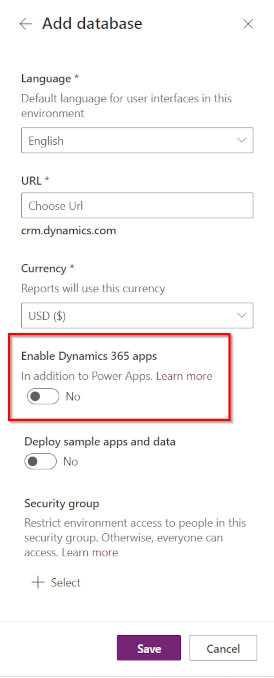
注意
如果为环境设置安全组,则只有该组中的用户才能查看这些项目和环境的其他信息。 此外,任务只能分配给该组中的用户。
将项目部署到环境
创建环境后,可以从 Power Platform 管理员 Center (PPAC) 将 Project 部署到环境。
从左侧导航菜单中打开“资源>Dynamics 365应用”页。 然后,将 Project Service Core 包安装到环境中。

注意
如果安装包未显示在可用包列表中,则租户没有 Project 许可证,或者环境是在启用“启用Dynamics 365应用切换”的情况下创建的。
配置角色和安全性
沙盒和生产环境需要其他配置。 将 Project Common 和 Project User 角色分配给将在环境中创建项目的任何人。 此外,请确保这些用户具有相应的 Project 许可证。
无需进行其他配置即可让用户在默认环境中管理项目。 默认环境中的用户只需项目许可证即可创建和管理项目。
注意
只有在将 Project Service Core 包部署到环境后,与项目相关的角色才可用。
在非默认环境中创建和管理项目
在非默认环境中,项目通过 Project Power App 创建和管理。 具有“项目用户”和“项目通用”角色的用户将看到“项目应用”磁贴显示在 “Office.com - 所有应用”部分中。
将环境部署到不同的 Geography
所有环境都将在最初创建租户的地理位置中创建。 若要在不同的地理位置创建环境,需要联系Microsoft销售代表或经销商来启用此功能。
疑难解答
系统要求
若要预配和使用Project 网页版,需要满足系统先决条件。 默认情况下,这些先决条件处于启用状态。 下表提供了这些系统先决条件的详细信息。
企业应用程序
应启用以下企业应用程序:
| Application Name | 应用程序 ID |
|---|---|
| Dynamics 预配 | 39e6ea5b-4aa4-4df2-808b-b6b5fb8ada6f |
| Common Data Service | 00000007-0000-0000-c000-0000000000000 |
| Microsoft Flow | 7df0a125-d3be-4c96-aa54-591f83ff541c |
| Microsoft PowerApps | 475226c6-020e-4fb2-8a90-7a972cbfc1d4 |
| Dynamics CRM Online Administration | 637fcc9f-4a9b-4aaa-8713-a2a3cfda1505 |
| Project Online | f53895d3-095d-408f-8e93-8f94b391404e |
验证企业应用程序的状态
若要验证是否启用了所需的企业应用程序,请执行以下步骤:
使用 以租户管理员身份登录 https://aad.portal.azure.com/
选择“ 企业应用程序”。 此时会显示 “企业应用程序 ”屏幕。
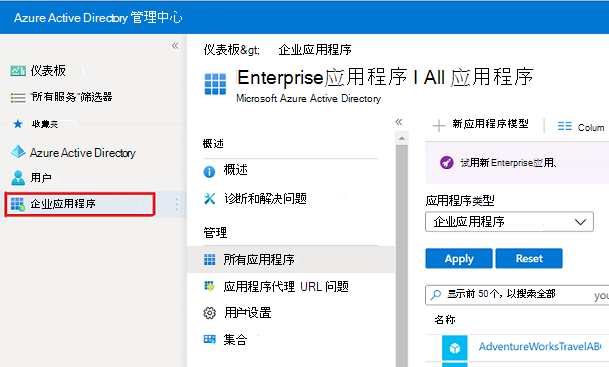
在“ 应用程序类型 ”下拉列表中,选择“ 所有应用程序 ”,然后选择“ 应用”。

使用此处显示的文本框并搜索表中列出的应用程序 ID。 例如 ,39e6ea5b-4aa4-4df2-808b-b6b5fb8ada6f。 应用程序 Dynamics Provision 显示在结果窗格中。
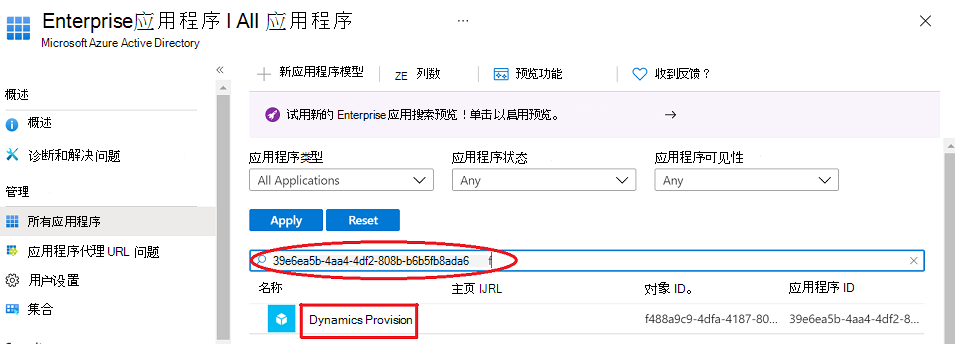
选择 “Dynamics 预配”。 “ Dynamics 预配” 屏幕随即出现。
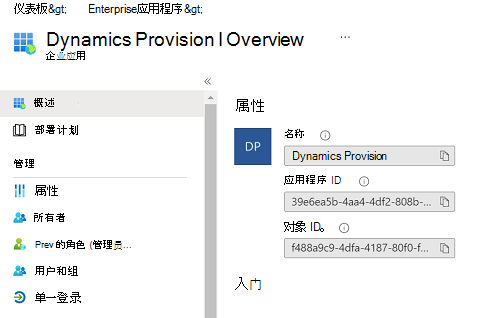
在左窗格中选择 “属性 ”。
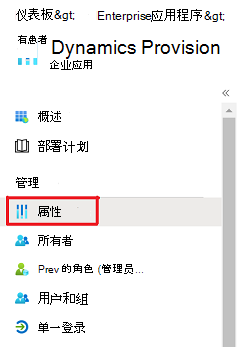
确保 “允许用户登录 ”设置为“ 是”。

对前面列出的每个企业应用程序重复步骤 1-7。
使用 Azure Active Directory PowerShell for Graph 验证所需企业应用程序的状态
对于喜欢使用 Azure Active Directory PowerShell for Graph 而不是上述手动步骤的管理员,如果启用了上述应用程序列表,他们可以使用以下脚本检查。 此外,它还会进行检查,以确保所需的企业应用存在,并且正确设置了 AppRoleAssignmentRequired 属性:
Connect-AzureAd
$ProjectRequiredApps = Get-AzureADServicePrincipal -Filter "
AppId eq '00000007-0000-0000-c000-000000000000'
or AppId eq '475226c6-020e-4fb2-8a90-7a972cbfc1d4'
or AppId eq '637fcc9f-4a9b-4aaa-8713-a2a3cfda1505'
or AppId eq '7df0a125-d3be-4c96-aa54-591f83ff541c'
or AppId eq '39e6ea5b-4aa4-4df2-808b-b6b5fb8ada6f'
or AppId eq 'f53895d3-095d-408f-8e93-8f94b391404e'
"
$ProjectRequiredApps | Select DisplayName, AppID, ObjectID, AccountEnabled, AppRoleAssignmentRequired, ReplyURLs | ft
#Check that all required Enterprise Apps are present. Create hashtable to check that app exists and if so remove from list. Entries left behind means it's missing.
[hashtable]$EntApps = [ordered]@{"Dataverse" = "00000007-0000-0000-c000-000000000000"
"Microsoft Flow Service" = "7df0a125-d3be-4c96-aa54-591f83ff541c"
"Dynamics Provision" = "39e6ea5b-4aa4-4df2-808b-b6b5fb8ada6f"
"Dynamics CRM Online Administration" = "637fcc9f-4a9b-4aaa-8713-a2a3cfda1505"
"PowerApps Service" = "475226c6-020e-4fb2-8a90-7a972cbfc1d4"
"Portfolios" = "f53895d3-095d-408f-8e93-8f94b391404e"
}
Foreach ($App in $ProjectRequiredApps) #Remove from hashtable if app exist.
{
If ($EntApps.Item($App.DisplayName))
{
$EntApps.Remove($App.DisplayName)
}
}
If ($EntApps.Count -gt 0)
{
Write-Host "Check#1: One or more required Enterprise Apps are missing." -ForegroundColor Red
Write-Host "Please check that you have 1 or more of the following subscriptions: Planner Plan 1, Planner and Project Plan 3, or Planner and Project Plan 5." -ForegroundColor Red
$EntApps | ft -a
}
else
{
Write-Host "Check#1: All required Enterprise Apps are present." -ForegroundColor Yellow
}
#Check that required apps are enabled (AccountEnabled=True) if not display message to enable the required Enterprise Apps.
If ($ProjectRequiredApps | ? {$_.AccountEnabled -eq $false})
{
Write-Host "Check#2: The following required AAD Enterprise App is disabled."
Write-Host "Instructions on how to enable the required app via Azure Active Directory Admin Center are at: https://learn.microsoft.com/project-for-the-web/deploying-project" -ForegroundColor Red
Write-Host "If you prefer using Powershell, for each App in the list use the Powershell cmdlet ""Set-AzureADServicePrincipal"" to enable the app." -ForegroundColor Red
Write-Host "Example:`n" -ForegroundColor Red
Write-Host " Set-AzureADServicePrincipal -ObjectId "“ObjectId GUID from below output."”-AccountEnabled `$true" -ForegroundColor Red
Write-Host "`nMore info on the cmdlet ""Set-AzureADServicePrincipal can be found"" at: https://learn.microsoft.com/powershell/module/azuread/set-azureadserviceprincipal" -ForegroundColor Red
$ProjectRequiredApps | Select DisplayName, AppID, ObjectID, AccountEnabled | ? {$_.AccountEnabled -eq $false} | ft
}
Else
{
Write-Host "Check#2: All required Enterprise Apps are enabled." -ForegroundColor Yellow
}
#Check that AppRoleAssignmentRequired for all required apps is set to False (AppRoleAssignmentRequired=False).
If ($ProjectRequiredApps | ? {$_.AppRoleAssignmentRequired -eq $true})
{
Write-Host "Check#3: The AppRoleAssignmentRequired property for the specified Enterprise App is set to True." -ForegroundColor Red
Write-Host "Out of box this setting should be set to False. If set to True, it can prevent Project for the Web from working correctly." -ForegroundColor Red
Write-Host "This setting can only be modified via Powershell, for each App in the list use the Powershell cmdlet ""Set-AzureADServicePrincipal"" to change the AppRoleAssignmentRequired to False." -ForegroundColor Red
Write-Host "Example:`n" -ForegroundColor Red
Write-Host " Set-AzureADServicePrincipal -ObjectId "“ObjectId GUID from below output."”-AppRoleAssignmentRequired `$false" -ForegroundColor Red
Write-Host "`nMore info on the cmdlet ""Set-AzureADServicePrincipal can be found"" at: https://learn.microsoft.com/powershell/module/azuread/set-azureadserviceprincipal" -ForegroundColor Red
$ProjectRequiredApps | Select DisplayName, AppID, ObjectID, AccountEnabled, AppRoleAssignmentRequired | ? {$_.AppRoleAssignmentRequired -eq $true} | ft -a
}
Else
{
Write-Host "Check#3: The AppRoleAssignmentRequired property for all required Enterprise Applications are set correctly." -ForegroundColor Yellow
}